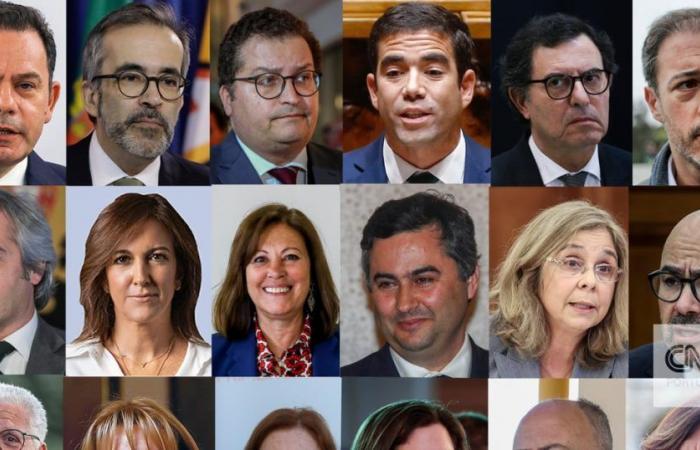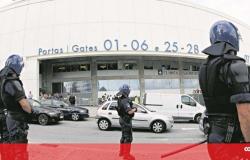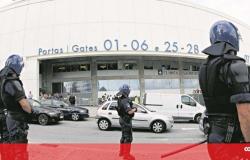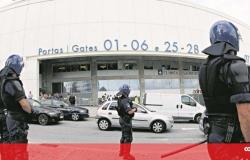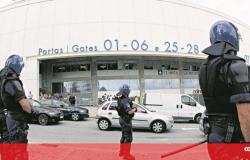The conditions are historic, but there are many difficult folders to resolve
Luís Montenegro inherits some notable financial indicators from the Government of António Costa, such as the largest budget surplus in the history of democracy and a public debt ratio below 100%. However, the Government of the Democratic Alliance (AD) also receives some of the portfolios that gave António Costa the most headaches in the last year of Government, and which remained unresolved. Three of them received a particularly difficult inheritance that requires greater short-term attention.
None of the new ministers inherited as many controversial portfolios as Miguel Pinto Luz, the one chosen to lead the Ministry of Infrastructure and Housing. This Ministry brings together two portfolios that have four of the most sensitive dossiers of this new executive: TAP, new Lisbon airport, TGV and the housing crisis.
“Miguel Pinto Luz is the minister I fear most and what I believe to be the weakest link in this Government, to tell the truth. He will have the most important dossiers and has, at times, expressed a preference for Santarém airport, for example . It doesn’t come from an exempt position”, says Miguel Sousa Tavares.
The privatization of TAP is the first dossier on the new minister’s desk, who is expected to continue the process initiated by the Government of António Costa, who in his last statement as Prime Minister called for this process to take place “without pressure”. At the same time, the final report of the Independent Technical Commission falls into Miguel Pinto Luz’s lap, which will make it possible to decide on the location of Lisbon’s new airport, a decision that has been dragging on for more than 60 years.
On top of all this, the new infrastructure minister also has in hand the construction of the high-speed railway line that will connect Lisbon to Porto. Presented in 2022 by António Costa and the then Minister of Infrastructure, Pedro Nuno Santos, the first section should be completed in time for the last year of the legislature, in 2028.
But the new combination of portfolios meant that Pinto Luz also inherited one of the biggest crises the country is going through, housing. House prices have continued to increase for several consecutive years due to the low purchasing power of Portuguese families. In the Democratic Alliance’s electoral program, the solution to this crisis involves a combination of tax benefits to encourage supply at affordable costs, simplification of licensing processes and public-private partnerships for large-scale construction. Owners associations have already admitted that they are “expectant” with the new executive and guarantee that they want to be part of the solution.
“This ministry will have four large, very complex dossiers. TAP, the TGV, the new airport and the railway, this is one of the big problems, and the opposition leader was active in this area and dominates the dossier. If it was already a tremendously complex situation, add housing. These are the big problems that the Portuguese are currently facing”, points out political scientist José Filipe Pinto.
Former police inspector for the police
Another “hot potato” falls into the hands of Margarida Blasco, judge of the Supreme Court of Justice, who was chosen by Luís Montenegro to lead the Internal Administration department. After several years of supervising the police at IGAI, and having been the first woman to head the Security Information Service (SIS), the new minister now has on the horizon the controversy surrounding the claims of the PSP and GNR regarding the risk subsidy equivalent to that of the Judicial Police and which led to a wave of protests.
Internal Administration is also one of the departments that will give the new executive the most political headaches, precisely because it is the one in which Chega, the third most voted party in the last elections, will want all of its demands to be heard.
In the seven years that she was at the helm of IGAI, Margarida Blasco had to manage some media cases, most of the time related to alleged police abuses. As a judge, cases such as the Camarate trial (plane crash in 1980 that killed the then Prime Minister Francisco Sá Carneiro and the Minister of Defense Adelino Amaro da Costa), the Dona Branca trial for financial fraud and the Fernando Negrão (former director of the Judiciary Police dismissed due to a leak of information about an investigation into the Modern University).
Education, “a big problem”
Protests, lack of teachers and thousands of students without classes make Education one of the most sensitive areas of this legislature. Economist and former Deputy Secretary of State for Internal Administration Fernando Alexandre was Prime Minister Luís Montenegro’s choice for Minister of Education, Science and Innovation. In fact, this is one of the new features: education, higher education and science are once again under the same umbrella.
Teachers must demand that the new minister fulfill his electoral promise to recover the frozen service time, which Montenegro promised to return in a phased manner until the end of the legislature. But the crisis in the sector is deep. Education not only has a lack of new qualified teachers but is also experiencing a record number of retirements. In the first two months of the year, more teachers retired than in the entire year of 2018. For experts, combining several portfolios in a single ministry will not make solving the problems any easier.
“I have reservations about combining Education, Science and Innovation, because these are departments that have functions that, being related, end up not always being compatible. At this moment, Education will have a big problem, because there are still schools without teachers. Science and Innovation are other levels”, warns professor José Filipe Pinto.
The money men
If Miguel Pinto Luz, Margarida Blasco and Fernando Alexandre inherited the hottest portfolios from the previous Government and will be under pressure as soon as they take office next Tuesday, Manuel Castro Almeida, Joaquim Miranda Sarmento and Pedro Reis take over the Money Ministries, with many millions to spend and many more to put the economy in the direction that the Social Democrats have long sought.
Manuel Castro Almeida returns to direct European funds in a social-democratic Government, which now includes the management of the Recovery and Resilience Plan (PRR), as the new Deputy and Cohesion Minister. Castro Almeida, a 66-year-old lawyer, already held the portfolio of community funds when he was Secretary of State for Regional Development under Minister Poiares Maduro, between April 2013 and October 2015, in the first Government of Pedro Passos Coelho.
According to the balance sent by Costa’s executive, in order for the Government to be able to request the fifth bazooka check, which amounts to 2.77 billion euros net, it will still have to complete five reforms and an investment, that is, if it does not want to have funds withheld by Brussels.
Millions that will not be missed by the new strongman of Finance. Joaquim Miranda Sarmento takes on one of the most demanding portfolios in Luís Montenegro’s executive, with the Ministry of State and Finance. The former economic advisor to the former President of the Republic Cavaco Silva receives from his predecessor the largest economic surplus in the history of Portuguese democracy and a public debt ratio below 100%, but that may not be enough.
“He is the man indicated without the indicated conditions. He is the great author of the economic program, but the big problem is that this is the European Union Government with the weakest parliamentary support (…) it is very difficult to commit to anything because it is not in a position to approve it”, he warns Pedro Santos Guerreiro, executive director of CNN Portugal.
Measures such as the generalized tax cut proposed by the AD may turn out to be easy to approve, since few parties are opposed, but other portfolios such as the 15th tax-free month will be more complicated to obtain approval in Parliament. Among the challenges ahead are factors that go beyond its control, such as the war in Ukraine and the conflict in the Middle East, interfering with fuel prices and creating problems in supply chains. Furthermore, the European Central Bank remains reticent about lowering interest rates, due to the fight against inflation.
The new minister is one of Luís Montenegro’s trusted members, whom he has accompanied in key meetings, and since July 2022 he has presided over the PSD parliamentary group. Together with the new Minister of Economy, Pedro Reis, he wrote the economic program of the Democratic Alliance.
If Finance has the money, Economy has the vision. Pedro Reis, former president of AICEP and banker, becomes Minister of Economy with the aim of making Portugal “make up for lost time” and try to get the country to grow 3.5% per year until the end of the legislature, in 2028 .
His plan is ambitious, but Pedro Reis guarantees that it is “realistic”. The economist argues that some structural changes in the economy are necessary to achieve this growth.
He is known for his “easy relationships” with companies, which he has always defended. For the now holder of the Economy portfolio, Portugal cannot miss the “European train” and national companies do not want promises, but commitments and results.

